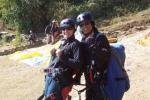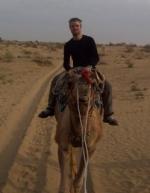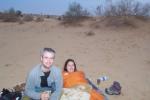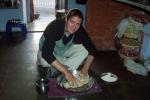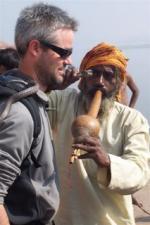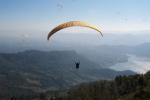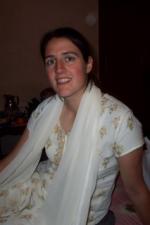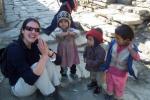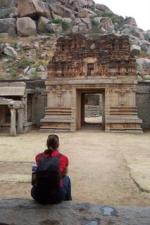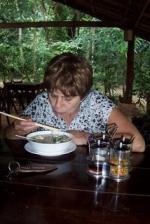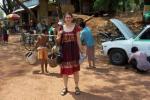|
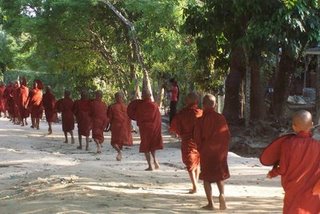
By the morning of the second day of the water festival, Yangon looked like a war zone. The streets were empty save for pickups carrying gangs of water-gun toting teens careening about in the ghostly wet streets. Over an egg breakfast, several backpackers cowered on a guesthouse patio showing off their hose welts and complaining about their predicament. The entire country was shut down in a water-logged state of nation-wide binge drinking. Nobody could get in or out of Yangon. In fact, nobody could leave within a few block of our guesthouse without being blasted by high-pressure ice water.
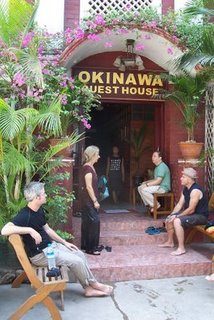
Andrew hanging out with the other stranded travellers at our Yangon guesthouse.
A long line of saffron robed monks strolled by for their morning alms. They live off the donations given to them by the rest of the community, devoting the rest of their time to meditation, study, and the sharing of Buddhist values. We were glad somebody was happy: people are particularly generous for Buddhist New Years alms, and nobody wanted the bad karma of hosing down a monk.
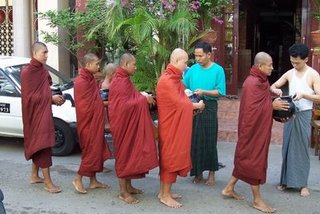
We decided to join up with our Yangon guide, Nu, to visit orphanages across the river. Trying our best to avoid any further engagements, we ran, ducked, and crept down back-alleys to a bus stop where Nu flagged down a pickup truck and pushed us on board. The passengers rolled their eyes when they clapped eyes on our white skin, knowing their dry pickup would now be targeted by every drunken Yangon yahoo with a water gun. To make matters worse, we didn't actually fit on the truck and a few previously comfortable commuters were asked to ride on the bumper and hang out the back for our sake. Clinging for dear life to the back of a truck while being fired upon with riot hoses is fine for the locals, but such activities are considered too dangerous for white tourists. The junta wants nothing to tarnish their beloved tourist industry, and the driver would stand to get into serious trouble if anything happened to us.
It wasn't long before we were spotted by the yahoos. "Here they come," muttered Katlijn.
I poked my head outside to see the approaching ambush: a couple of bucket-toting kids and some whisky-drinking Indians on hose duty. "You know the drill," I replied dryly.
We clasped our hands over are ears, shut our eyes, and ducked underneath the bench.
"Happy New Years !"
And with that, our driver hit the accelerator and we roared through the deluge. The velocity of the truck working against that of the incoming water buckets produced a loud smacking sound when the freezing water splashed against our backs. A frail old woman sitting across from us got a particularly violent slap to the face. Everyone on board remained exceptionally friendly with us, but we feared our popularity would start to wane after a few more of these incidences. We chose to step off as soon as we were close enough to the orphanage to walk the rest of the way.
The post-colonial renaming plague sweeping across Asia has also struck the country of Myanmar in a devastating wave of utter confusion. The British invented the name "Burma" after the "Burman" people who are the dominant ethnic group. However, the political situation in the country is far messier than this colonial-era name implies. Over one hundred different ethnic groups are known to live in Myanmar, and there are at least one hundred and nine different languages spoken in the country. Many of these ethnic groups have been fighting each other for centuries and are also sworn enemies of the predominantly Burmese military junta. To help pacify some of these people, the junta changed the name of the country to the more inclusive "Union of Myanmar". Americans and British do not view the military regime as the country's legal governing body with authority to change the country's name and therefore continue to use the old British name "Burma". Thus, we now have the awkward choice of selecting the imperialist name of "Burma", or recognizing a brutal military regime by using the less racy "Union of Myanmar".
Changing the name of the country and providing other political incentives was not enough to placate all the ethnic groups wanting either more autonomy or outright independence. For the last fifty years, the military junta has been battling several disparate insurgencies in various parts of the country, and there are credible reports of retaliatory killings, rapes, and other atrocities committed by the army against civilians. Most of this fighting is contained in remote mountain regions so nobody really knows what is going on. However, there is a constant stream of traumatized orphans fleeing these contested regions who, if they are lucky, may eventually find themselves in the sanctuary of a monastery. Soaking wet and fearing rejection by our fellow commuters, Nu took us to visit two of these.
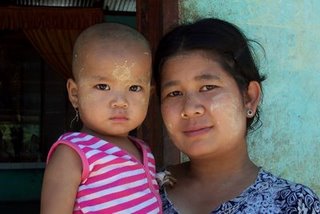
The first orphanage was run by monks- all men in saffron robes. The monks shared their food with us: a huge banquet provided by today's bloated New Year's alms. It was probably the tastiest and most glutinous feast we ever ate in Myanmar. So much for the middle road !
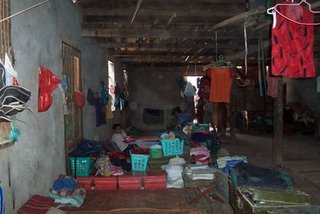
Children's dormitories. Each child has his or her own space with a bed and a metal chest containing their belongings. They sleep and do their homework here. It is possible to obtain a high school degree at the monastery, but we only met one girl who made it that far in her studies.
The orphanage was basically a ramshackle arrangement of dilapidated monasteries and concrete dormitories with corrugated tin roofs providing shade for several dozing monks. While perhaps more spiritually advanced than your average layabout, Myanmar's monks could certainly loaf about with the best of us. They had all the laid-back attitude and Eastern philosophical bent of a Berkeley hippie, but without the free-love, drugs, and poor hygiene. Otherwise, while the compound definitely lacked a woman's touch, it had a kind of fun chaotic air as the children's variegated smiles of multiple ethnic origins ran amok in celebration of Buddhist New Years. The kids went absolutely wild when we showed up, desperate to bless us with a cup of scented water, gawk at our giant white bodies, and pull my exotic arm and leg hairs- a favorite feature of mine with Burmese children guaranteed to produce squeals of glee. The monks had built them a little wooden platform on the road where they could participate in the water festival like other kids in Yangon. Fortunately for us, there was just enough discipline at the monastery to forbid the use of fire hoses.
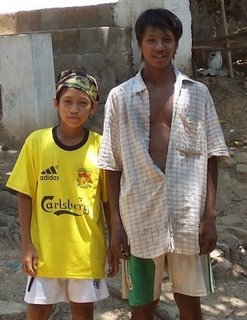 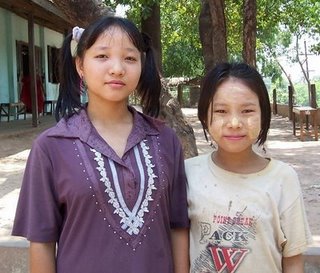
Not all was right at the monastery. Some of the little girls were covered in scabs, and another didn't speak at all but stared blankly forward in a permanently heartbreaking forlorn expression. The abbot looked positively exhausted and depressed. Nu insisted he was normally a loquacious host and provided the following bizarre explanation for his current mood:
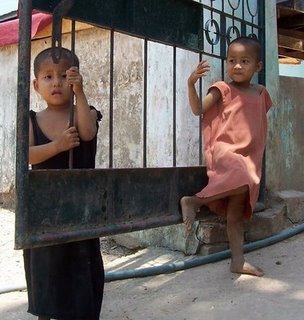
The monastery owns two giant pet pythons. The pythons slither freely around the compound and the kids are allowed to "play" with them, presumably unsupervised by the looks of the place. While that all sounded pretty scary to me, snakes are held in high esteem by Buddhists. Besides, we are told the children love them to pieces.
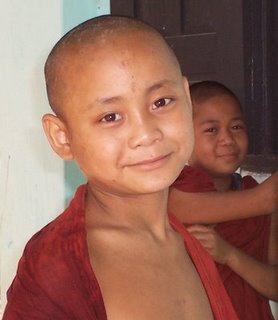
|



